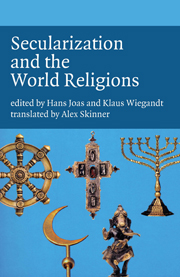Book contents
- Frontmatter
- Contents
- Notes on Contributors
- Foreword
- Society, State and Religion: Their Relationship from the Perspective of the World Religions: An Introduction
- 1 Catholic Christianity
- 2 Protestantism
- 3 The Departure and Return of God: Secularization and Theologization in Judaism
- 4 Islam and Secularization
- 5 Hinduism
- 6 Secularization: Confucianism and Buddhism
- 7 From Hostility through Recognition to Identification: State–Church Models and their Relationship to Freedom of Religion
- 8 ‘Science Doesn't Tremble’: The Secular Natural Sciences and the Modern Feeling for Life
- 9 The Religious Situation in Europe
- 10 The Religious Situation in the USA
- 11 The Religious Situation in East Asia
- 12 The Relevance of the European Model of Secularization in Latin America and Africa
- 13 The Desecularization of the Middle East Conflict: From a Conflict between States to a Conflict between Religious Communities
- Afterword
5 - Hinduism
- Frontmatter
- Contents
- Notes on Contributors
- Foreword
- Society, State and Religion: Their Relationship from the Perspective of the World Religions: An Introduction
- 1 Catholic Christianity
- 2 Protestantism
- 3 The Departure and Return of God: Secularization and Theologization in Judaism
- 4 Islam and Secularization
- 5 Hinduism
- 6 Secularization: Confucianism and Buddhism
- 7 From Hostility through Recognition to Identification: State–Church Models and their Relationship to Freedom of Religion
- 8 ‘Science Doesn't Tremble’: The Secular Natural Sciences and the Modern Feeling for Life
- 9 The Religious Situation in Europe
- 10 The Religious Situation in the USA
- 11 The Religious Situation in East Asia
- 12 The Relevance of the European Model of Secularization in Latin America and Africa
- 13 The Desecularization of the Middle East Conflict: From a Conflict between States to a Conflict between Religious Communities
- Afterword
Summary
Statistics have taught us to regard Hinduism as the third largest contemporary religion in terms of number of adherents, after Christianity and Islam. Hindus make up 89 per cent of the population in Nepal, 82 per cent in India, 52 per cent on Mauritius, 38 per cent and 37 per cent in the South Pacific and the Caribbean; and they also live, as extremely large and, for some years, rapidly growing minorities, in the USA and Canada, Australia, Southeast Asia, the Arab countries, Africa and Europe. Hindus number around 900 million in total. If, as has been argued for many years with reference to the Indian constitution by the ‘World Hindu Council’, the highly active Vishva Hindu Parishad (VHP), we add all religions originating in India, in other words Buddhism, Jainism and the indigenous tribal religions, Hinduism even appears, statistically, to be the second largest of all religions. On this point, the authors of the constitution have followed the views of Vināyak Dāmodar Sāvarkar, who describes as Hindus the followers of all religions originating in India. Such religions fulfil all the fundamentals of Hinduism: common land, common culture and common origins (jāti). The gods invoked within them inhabit the holy land of India.
But is Hinduism one religion in the first place? Some years ago, I pointed out that so-called Hinduism comprises a whole number of different religions, which, however, coexist so peacefully and are blended together to such an extent on the Indian subcontinent that Europeans, used to bloody religious conflicts, inevitably come away with the impression that we must be dealing with just one religion.
- Type
- Chapter
- Information
- Secularization and the World Religions , pp. 122 - 140Publisher: Liverpool University PressPrint publication year: 2009



